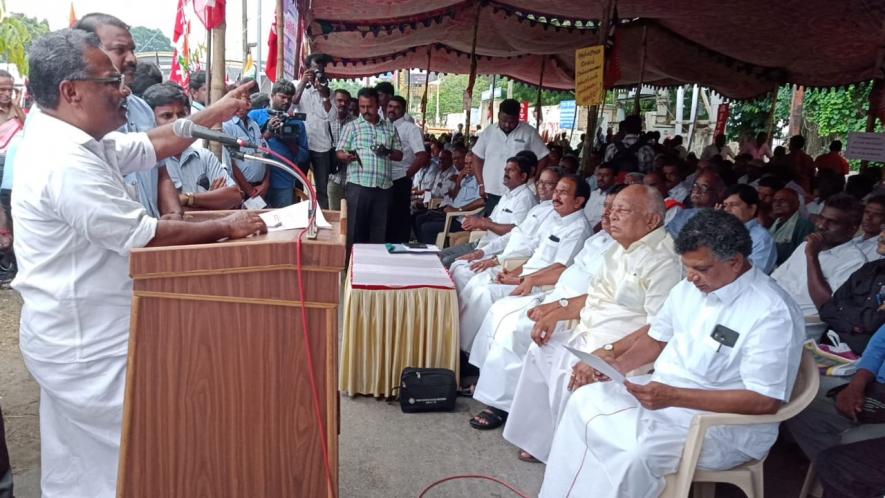Stop Privatisation of Salem Steel Plant, Say Workers on Hunger Strike

G Sukumaran, general secretary, CITU Tamil Nadu state committee, addressing the SSP workers on hunger strike. Photo: Neelambaran A
The trade unions of Salem Steel Plant (SSP) plan to hold a massive hunger strike in front of the Salem district collector’s office on Thursday as a part of the ongoing struggle against the privatisation of SSP by the central government. The indefinite standby protest to drive away the “trespassing” corporate bidders by the trade unions has entered its 18th day.
The trade unions including Centre for Indian Trade Unions (CITU), All India Trade Union Centre (AITUC), All India Central Council of Trade Unions (AICCTU), Hind Mazdoor Sabha (HMS), Indian National Trade Union Congress (INTUC) and Labour Progressive Federation (LPF) have called for the hunger strike.
State Government Should Intervene
The hunger strike is aimed at pressurising the central government into dropping its plan to privatise the SSP and at demanding intervention of the Tamil Nadu government to annul the global tender. The Centre led by the Bharatiya Janata Party (BJP), after assuming power for the second consecutive term, has furthered its plan to privatise even the profit-making Public Sector Undertakings (PSUs).
Panneer Selvam, president of the Steel Plant Employees’ Union affiliated to CITU while speaking to NewsClick said, “The move to privatise the SSP is one of the cruellest things a government can do. The Union government has been speaking about working for the welfare of the common man, but it is supporting the corporates with all its might. The state government should interfere and ensure the continuation of SSP as a PSU and [make sure that it] is not sold to the private players”.
“The Centre has called for a global tender to sell off SSP to private companies and the companies that do not have any experience in steel manufacturing can also stake claim in SSP. This is the magnitude at which the union government is helping the corporate companies,” he said.
Loan from SAIL Resulted in Loss
Even though the SSP had been making profits until the last few years, the loss is attributed to the loan of Rs 2300 crore taken from the Steel Authority of India Limited (SAIL) in 2010 for expansion. The SAIL, instead of contributing internal financial source, decided to lend the amount as commercial loan. The SSP is paying an interest of Rs 120 crore per year to the SAIL. The SSP has so far paid around Rs 700 crore to SAIL only as the interest component over the past few years.
The government is not prepared to cancel the interest component to be paid by the SSP. If such a decision is made, the SSP will become a profit-making entity immediately, the union office bearers claim.
Future of Steel Industry is Bright
The demand of steel has been on the rise and the market demand is expected to increase by 9% annually. The Steel Policy 2017 of the government of India too has expressed confidence in the growth of the industry. The stainless steel products are preferred for carrying drinking water, passenger seats, in metro rails, hand rails, small and medium enterprises including motels, bakeries, thus increasing the application and demand. The SSP is the only PSU involved in manufacturing of steel with a legacy of over 40 years.
Government Apathetic to SSP
The reduction in order from the Indian Railways and the minting of coins by the government have also been cited as the reasons behind the loss faced by the SSP. “The employees are already striving hard to bring the SSP back to glory, but the Department of Steel has shown little interest in reviving the PSU. The products manufactured by SSP are of international quality and have global recognition. Also, the plant’s proposal to generate electricity on its own was submitted in 2017, but has seen no light so far. The generation of electricity will bring down the electricity tariff by Rs 34 crore per year. With all these proposals and credentials, a very minimal intervention will revive the plant very quickly,” added Panneer Selvam.
By planning to hand over the SSP to the private players, the government of India is effectively creating a monopoly in the area of steel products manufacturing. This would further increase the recurring expenditure of the consumers including the Indian railways and many other PSUs and the general public.
Farmers Support the SSP Struggle
Hundreds of farmers who gave away their lands for the construction of SSP have extended solidarity to the struggle of the SSP employees. The farmers of 23 villages in the locality have sacrificed their lands – about 4,000 acres – for the SSP to be established. About 1,200 acres of acquired land, however, is lying vacant even today.
The farmers who participated in the protest demanded that their lands should not be handed over to the private players in the name of privatisation of the SSP. They also insisted that the lands should be used for further development of SSP and not for the benefit of the corporate giants.
Loss-making Entities Eying SSP
The loss-making entities in the field of steel manufacturing including Essar, Bhushan Steel Limited (BSL) [which was taken over by Tata Group in 2018] are eying the SSP with full-fledged backing of the Narendra Modi-led government. The National Company Law Tribunal (NCLT) has commented that Essar cannot repay its debt even if it was given 25 years. The taking over of BSL by Tata group resulted in a loss of around Rs 21,000 crore to the Indian Bank, effectively resulting in the loss of public money.
The present government, which is running amok with its privatisation agenda, is pushing all major PSUs into the profit-hungry corporate friends’ hands, while the public of the country continue to be misguided.
Get the latest reports & analysis with people's perspective on Protests, movements & deep analytical videos, discussions of the current affairs in your Telegram app. Subscribe to NewsClick's Telegram channel & get Real-Time updates on stories, as they get published on our website.
























